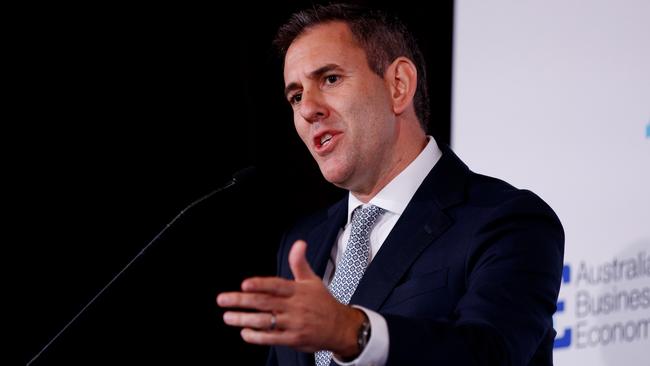Power bill price spike tipped without rebate extension
Households are set to experience an unprecedented increase in their electricity costs unless power bill subsidies are extended.

Households are set to experience an unprecedented increase in their electricity costs unless federal and state power bill subsidies are extended, as Labor mulls renewing its $300 energy rebate ahead of the impending election.
While Jim Chalmers on Wednesday lauded new figures showing headline inflation rose by 2.5 per cent in the 12 months to January, the data foreshadowed an expected surge in power bills in the months ahead.
Even as the new figures revealed electricity prices were 11.5 per cent lower in the 12 months to January, power bills vaulted by 8.9 per cent last month alone as Queensland households continued to exhaust their $1000 rebates provided by the state’s former Labor government.
That increase means out-of-pocket electricity costs have risen by 31.3 per cent since October, according to data compiled by Westpac economist Justin Smirk, who forecasts that electricity prices could rise by an additional 29.9 per cent by the end of 2025 in the event that the existing energy rebates are not extended.
Amid pressure from Labor backbenchers to provide additional cost-of-living support, the Treasurer is yet to confirm an extension of the subsidies – which cost $3.5bn in last year’s federal budget – but flagged a continuation of the measure was “under review” earlier this month.
Peter Dutton, however, has expressly ruled out extending the rebate, arguing it has only provided temporary relief, while claiming it has masked the underlying problems facing households amid the cost-of-living squeeze.
Speaking after the release of the inflation figures, Dr Chalmers attacked the Opposition Leader over the Coalition’s refusal to support Labor’s cost-of-living measures.
“Australians would be worse off under Peter Dutton, who opposed the cost-of-living help we are rolling out right now and who would make things worse, not better,” Dr Chalmers said.
Without a third consecutive extension of Labor’s rebates, the surge in household electricity bills would be felt most acutely in Queensland and Western Australia where, in addition to the $300 discount, Labor state governments showered households with further support to assist in their re-election efforts.
While expecting the surge in energy prices could last until 2026 unless the rebates were renewed, AMP chief economist Shane Oliver cautioned against an extension of the subsidies.
“They’re not a very good use of public money, but they’re very hard to take away,” Dr Oliver said. “Once you do it, it’s very hard to remove it. We’re potentially in a situation here where you could be rolling these subsidies over indefinitely.
“Simply put, they just buy the government a bit of time and buy a bit of support from voters. I don’t think any economists would support them.”
Since the latest round of support effect in July 2024, federal and state energy bill rebates have helped lower the headline inflation rate sharply, which fell to just 2.1 per cent in September last year. The RBA, however, expects the headline rate to rebound to 3.7 per cent once the support expires at the end of June.
Given the temporary nature of the cost-of-living assistance, RBA governor Michele Bullock has stressed that the central bank is more closely monitoring underlying price pressures as measured by its preferred trimmed-mean inflation gauge.
On that measure, price pressures intensified in January, edging up to 2.8 per cent, and likely precluding it from delivering back-to-back rate cuts.
While the RBA last week delivered a quarter-percentage-point rate cut, taking the official cash rate to 4.1 per cent, Ms Bullock said on Friday that the central bank’s job to tame inflation was “definitely not done” and played down the prospect of further cash rate cuts.
“We have not pre-committed to any particular course of action on interest rates,” Ms Bullock told parliament’s House of Representatives economics committee. “If monetary policy is eased too quickly or by too much, disinflation could stall and inflation would settle above the midpoint of the target range.”
Since the RBA’s decision, bond traders have pared back their expectations for a further easing of interest rates. Money markets are now fully priced for just two more quarter-percentage-point reduction by year’s end.




To join the conversation, please log in. Don't have an account? Register
Join the conversation, you are commenting as Logout